The President of Uzbekistan puts forward key initiatives to expand practical cooperation within UNESCO
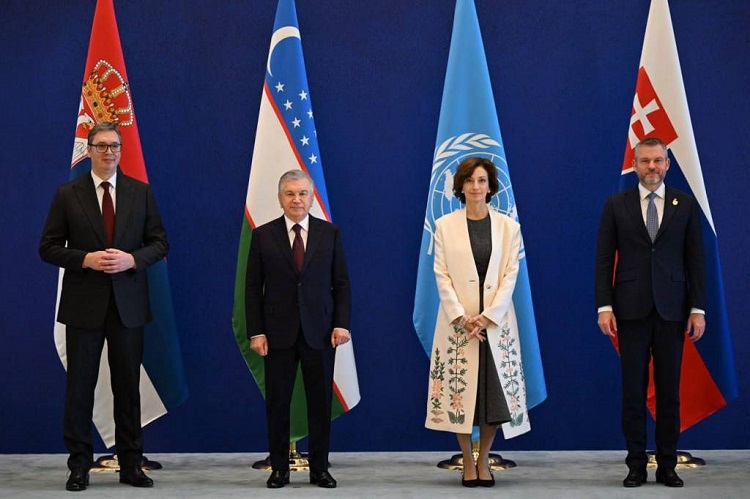
On October 30, the President of the Republic of Uzbekistan Shavkat Mirziyoyev took part in the opening ceremony of the 43rd session of the General Conference of the United Nations Educational, Scientific and Cultural Organization (UNESCO), held in Samarkand.
The Head of State warmly welcomed all participants of the forum to the hospitable Uzbekistan – the crossroads of cultures and civilizations. He expressed his deep gratitude to the President of Serbia Aleksandar Vučić, the President of Slovakia Peter Pellegrini, UNESCO Director-General Audrey Azoulay, heads of foreign governments, representatives of international and regional organizations, and all delegations for their participation in the conference.
The President emphasized that this session is being held for the first time in 40 years outside UNESCO’s headquarters in Paris.
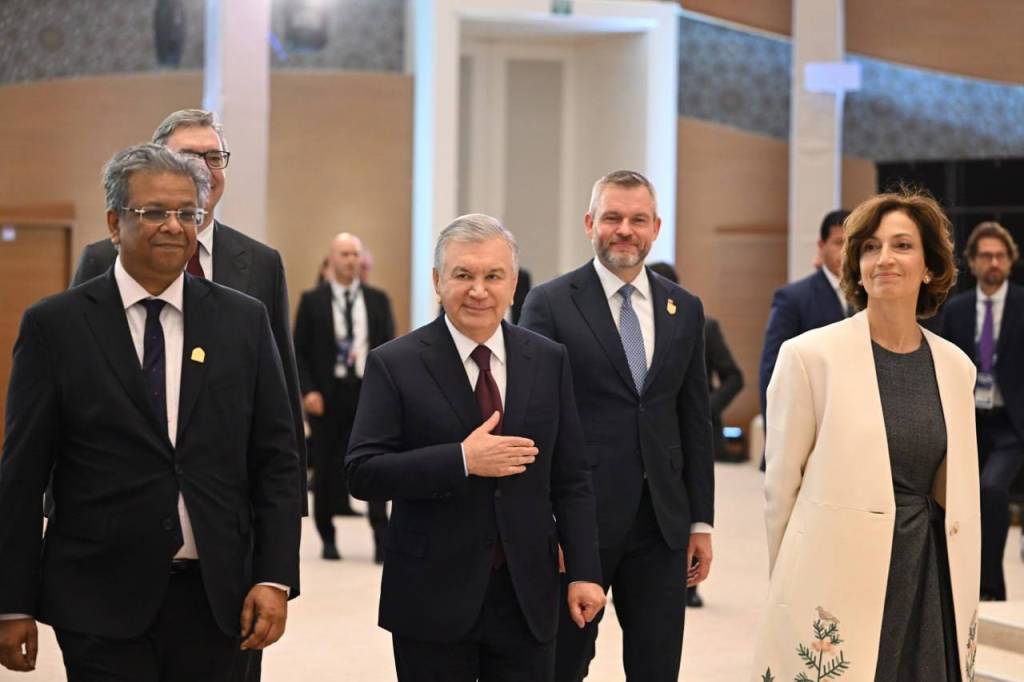
“We view the holding of such a representative forum in Samarkand as a manifestation of the high trust placed by UNESCO Member States in the large-scale and accelerated reforms being implemented in New Uzbekistan”, stated the Head of State.
The President of Uzbekistan emphasized that, over its 80-year history, UNESCO has become a respected global institution, fostering international cooperation in education, science, culture, and information, and strengthening trust and solidarity among nations.
In this context, UNESCO’s growing role was highlighted in preserving national identity and cultural heritage, and in promoting closer interfaith and intercultural dialogue.

“It is deeply symbolic that our forum is taking place in Samarkand – a city that has entered human history as a center of humanistic ideas, invaluable knowledge, and intercivilizational dialogue”, the President said.
The Head of State recalled the great legacy of Samarkand as a cradle of science, literature, and culture, referring in particular to the observatory of Mirzo Ulugbek, where the famous star catalogue was created, a work that later influenced the discoveries of Copernicus and Kepler. The President called on guests to immerse themselves in the spirit of Samarkand – the jewel of the Great Silk Road, a land of peace and friendship among peoples.
It was noted that geopolitical tensions and armed conflicts are damaging unique monuments and cultural heritage, while the gap in access to knowledge and digital technologies is deepening global inequality.
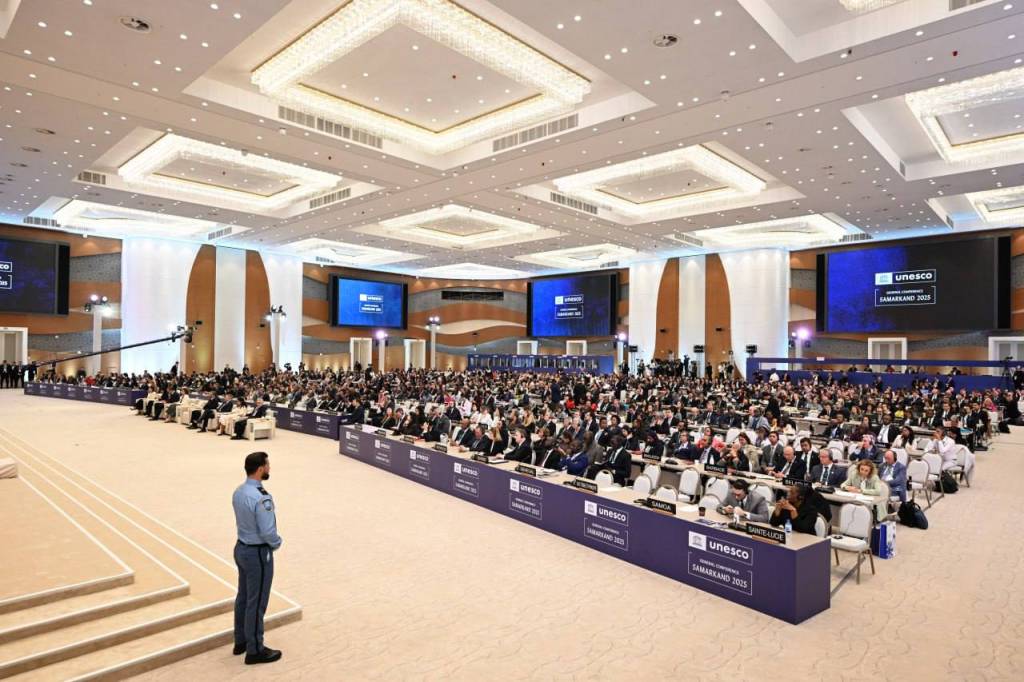
The President of Uzbekistan stressed that, in such challenging circumstances, strengthening solidarity to fulfill UNESCO’s core mission is particularly important. Uzbekistan once again reaffirmed its commitment to UNESCO’s noble goals and its readiness to serve as a bridge between East and West, North and South, providing an open platform for constructive cooperation.
Today, the country is implementing a five-year cooperation program with UNESCO through 2027. Within this framework, several large-scale events have been held, dedicated to the anniversaries of great thinkers and historical figures such as Abu Rayhan Beruni, Ahmad Fergani, Amir Temur, Ali Qushchi, and Kamoliddin Behzod, as well as to commemorating scientific institutions like the Khwarezm Academy of Mamun and literary masterpieces, including the epic “Alpomish”.
In addition to the cities already included on the World Heritage List – Khiva, Bukhara, Shahrisabz, and Samarkand – monuments along the Zarafshan – Karakum Corridor have now been added. The natural territories of the Western Tien Shan and the Turan Deserts also reflect the region’s unique biodiversity.
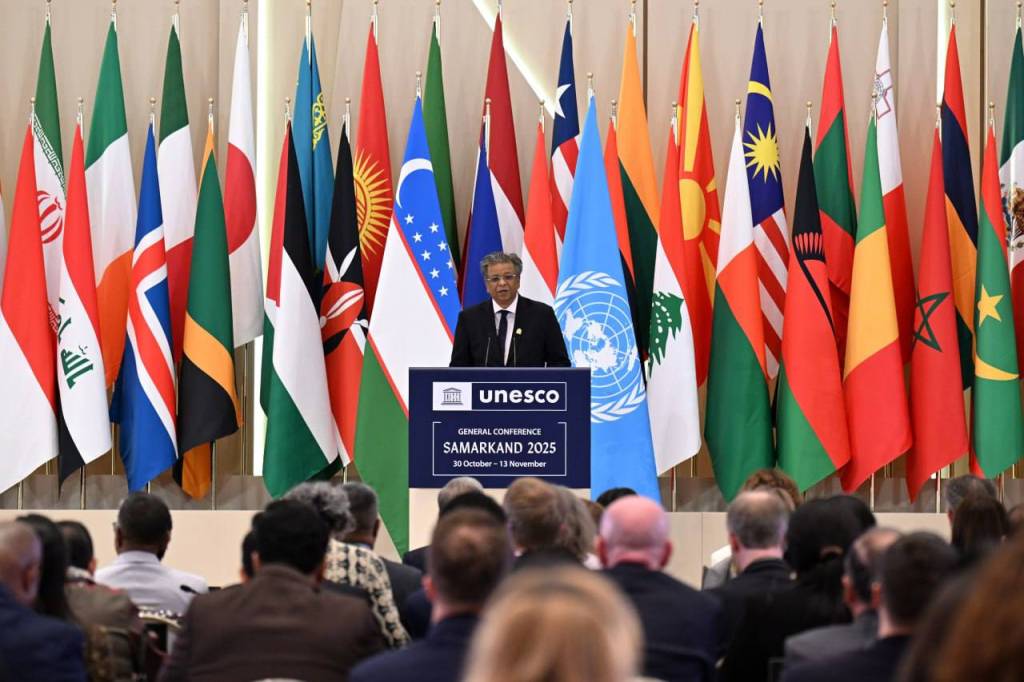
The President recalled that around twenty elements of Uzbekistan’s intangible cultural heritage have been recognized by UNESCO – among them Shashmaqom, Katta Ashula, the Lazgi dance, the art of Askiya, miniature painting, the Navruz celebration, and the traditions of atlas and adras weaving. Under the auspices of the Organization, Uzbekistan also hosts major festivals such as “Sharq Taronalari” (Melodies of the East), the Maqom Art Festival, the Bakhshi Storytellers Festival, and events celebrating folk crafts and ethno-sports.
Special attention was given to UNESCO resolutions initiated by Uzbekistan, including: the Khiva Process: Promoting International Collaboration in Central Asia, the Tashkent Declaration on Early Childhood Care and Education, and the Tashkent Declaration on Universal Access to Information.
Uzbekistan is home to UNESCO Chairs and partner schools, while the cities of Tashkent and Fergana have been included in the UNESCO Global Network of Learning Cities. Furthermore, hundreds of cultural heritage sites across the country have been restored using modern technologies and international standards.
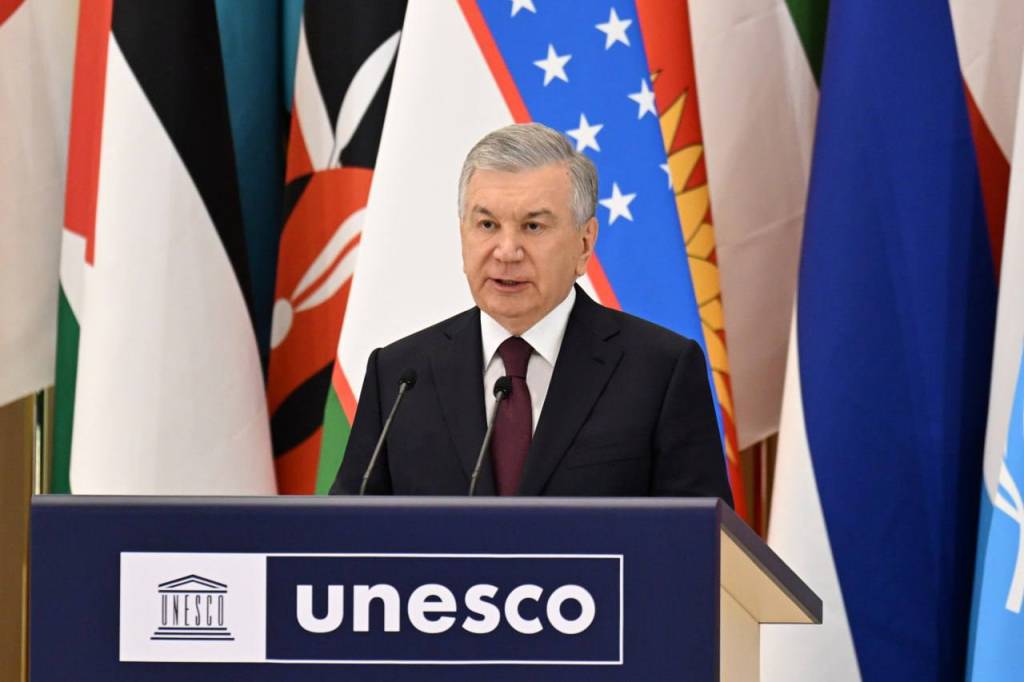
The President announced that several additional events are being held as part of the Samarkand Conference, including the Contemporary Art Biennial in Bukhara, the opening of the UNESCO Regional Center for Early Childhood Education Development in Tashkent, the ceremony for the UNESCO – Uzbekistan Abu Rayhan Beruni International Prize, and a conference on the use of artificial intelligence in the museum sector. Uzbekistan will also join the Global Convention on the Recognition of Qualifications concerning Higher Education.
The Head of State then presented several proposals and initiatives to advance UNESCO’s key areas of activity.
The development of inclusive education and the use of artificial intelligence technologies were identified as absolute priorities. The President proposed the creation of a UNESCO Platform for the Development of Inclusive Education for Children with Special Needs and the holding of a World Summit on Vocational Education. Uzbekistan is ready to implement a pilot project titled “School of Artificial Intelligence” and to host an International Expert Forum on Artificial Intelligence Ethics under the auspices of UNESCO.
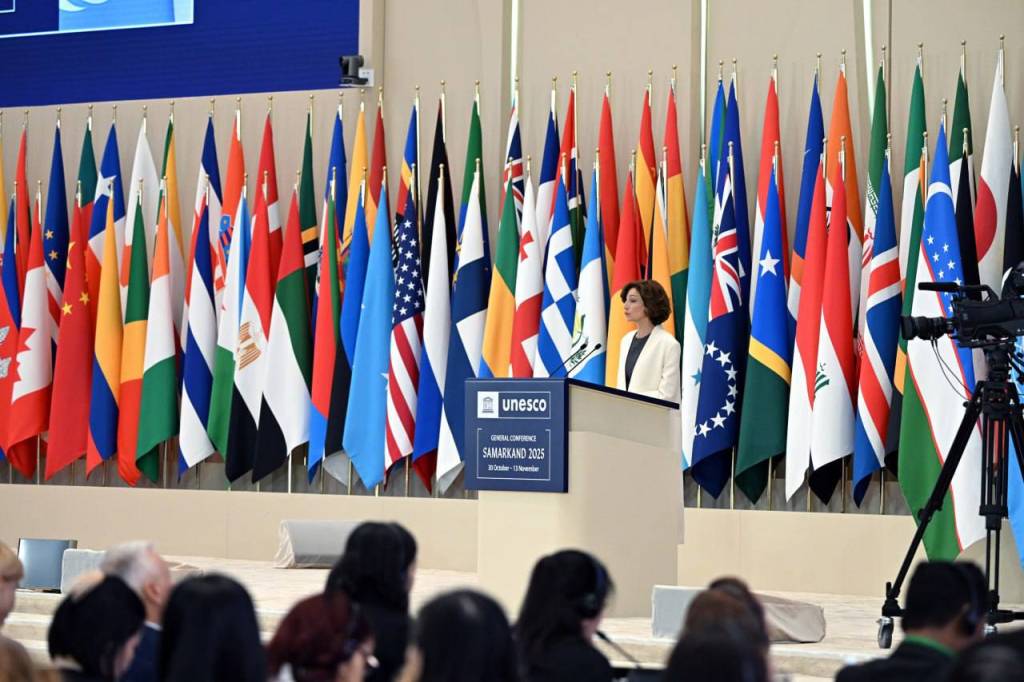
The President of Uzbekistan also called for greater efforts to preserve intangible cultural heritage. He expressed interest in advancing UNESCO’s “Memory of the World” Program, established to protect and ensure access to unique heritage objects, including oral folklore, manuscripts, archives, valuable historical documents, and cultural records.
The President proposed declaring November 19 as the International Day of Documentary Heritage and creating an International Institute of Digital Heritage within UNESCO.
The Head of State also suggested holding an International Handicrafts Congress in Bukhara in 2027 within the framework of the UNESCO Creative Cities Network.
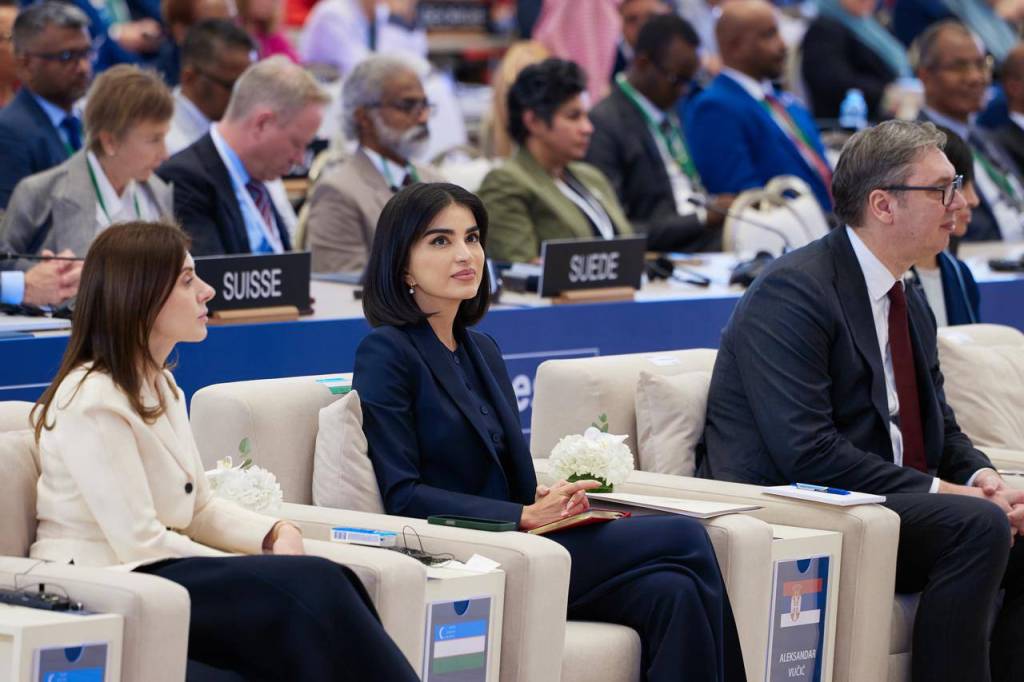
To promote gender equality and women’s leadership, the Head of State advocated for the establishment of a UNESCO Academy on Women’s Leadership and for hosting a Global Forum of Women in Education, Culture, and Science in Samarkand, bringing together distinguished researchers, artists, educators, and innovators from around the world.
Another pressing issue, the President noted, is the need for effective joint action to combat the climate crisis.
The Head of State emphasized the negative impact of climate change on cultural heritage and proposed launching the international initiative “UNESCO Ecological Capital” and developing a UNESCO Executive Board Resolution on Strengthening Measures to Safeguard Cultural Heritage amid Globalization and Climate Change. Uzbekistan also expressed its readiness to host an international symposium on this topic in Khiva.

Among other priorities, the President highlighted the importance of countering misinformation in the digital space, protecting public opinion, and combating discrimination. He proposed organizing an International Festival of Children’s Cultural Content and developing a Comprehensive UNESCO Strategy on Media Literacy Development.
The President also underlined the importance of strengthening interfaith harmony, combating radicalism and Islamophobia, and promoting Islamic culture and enlightenment worldwide: “It is essential to widely promote such universal values as tolerance, mutual understanding, and harmony”.
The President proposed actively utilizing the potential of Uzbekistan’s unique cultural and research institutions, including the Center for Islamic Civilization and the research centers dedicated to Imam Bukhari, Imam Maturidi, Imam Termizi, and Bahauddin Naqshband.
Summing up his remarks, the President of Uzbekistan expressed confidence that the forum would become an essential step toward establishing new areas of cooperation, strengthening mutual trust and global partnership, and advancing sustainable development.
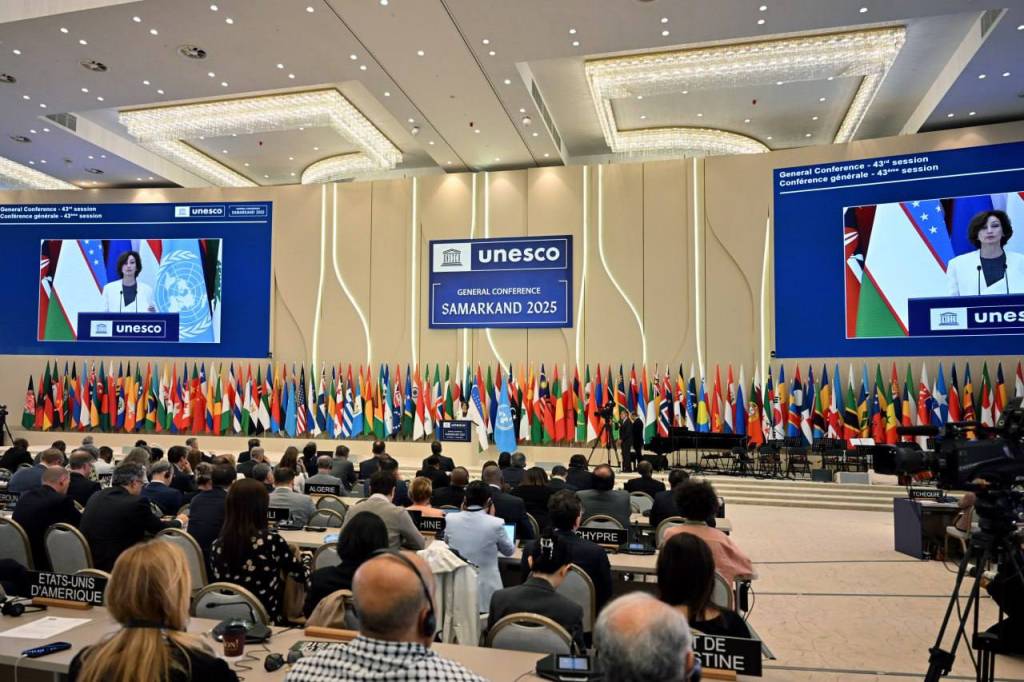
It was emphasized that the “Spirit of Samarkand”, grounded in UNESCO’s eternal traditions and values, would continue to inspire future collaboration for the common good and global progress.
Concluding his address, the Head of State wished all participants a successful and productive conference, noting the symbolism of hosting such a significant event in Samarkand – a city that embodies peace, friendship, and mutual understanding among nations, reaffirming Uzbekistan’s high international standing and its contribution to promoting inter-civilizational dialogue, mutual understanding, and the preservation of humanity’s cultural heritage.
Following the opening ceremony, a concert featuring renowned Uzbek and international artists was held. The program included masterpieces of Uzbek classical music and world musical heritage, reinterpreted in a modern style and performed by a symphony orchestra, choir, and national ensemble.
















